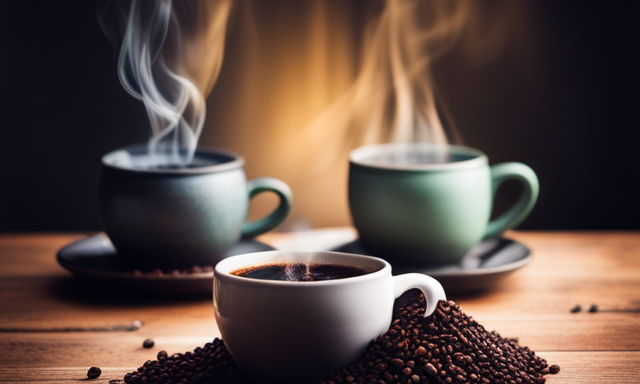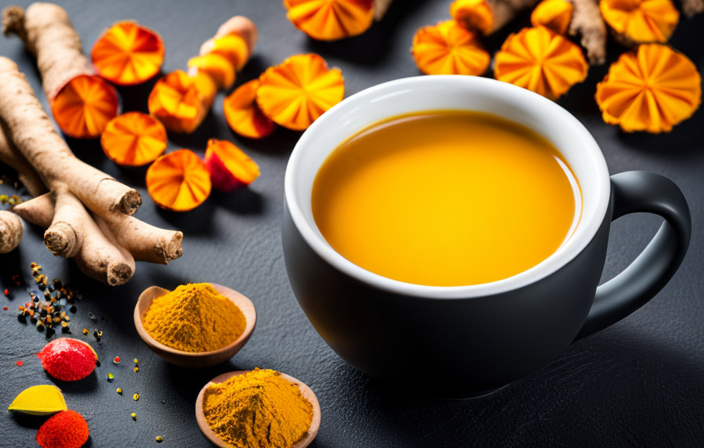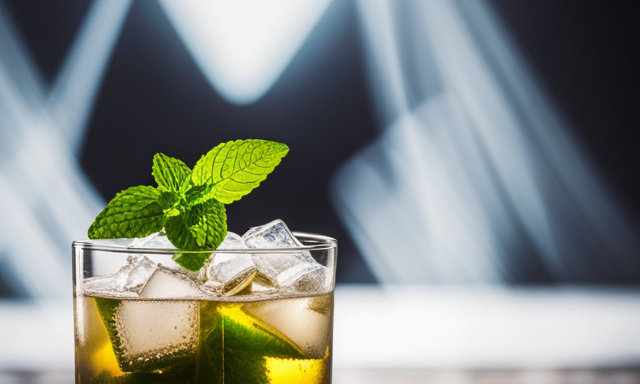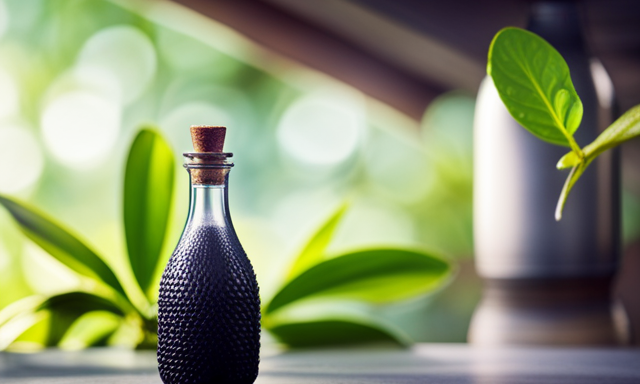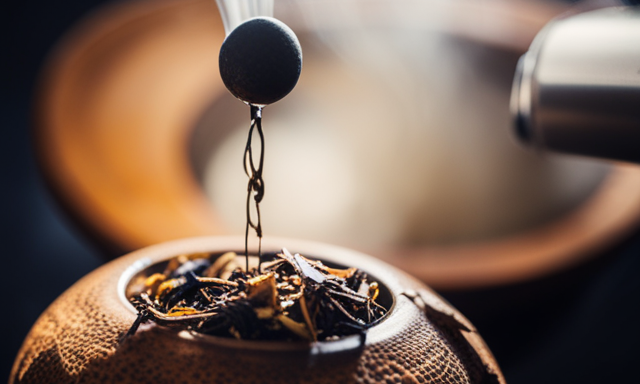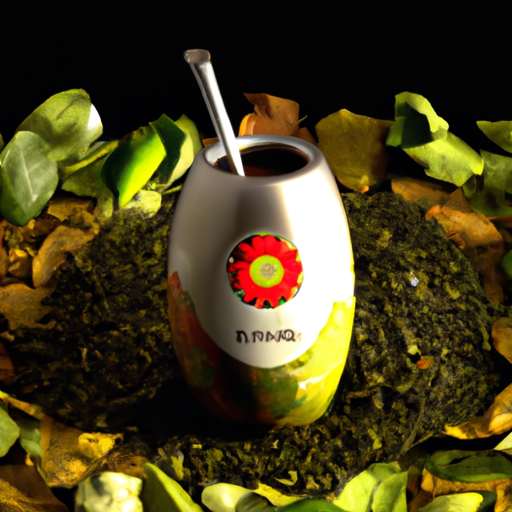Imagine yourself at a junction, having to choose which way to go. To one side, there’s a piping hot cup of coffee, beckoning you with its deep scent and comforting flavor. On the opposite, a gourd brimming with the lively green brew of yerba mate, offering an extraordinary and stimulating adventure.
Both beverages have their loyal followers, but which one holds the title for the most caffeine? In this article, we will delve into the world of yerba mate and coffee, exploring their caffeine content, effects on the body, and health benefits.
With evidence-based information, we aim to provide you with the knowledge to make an informed choice between yerba mate and coffee. So, grab a seat, prepare yourself for a journey of discovery, and let’s find out which beverage packs a stronger caffeine punch.
Key Takeaways
- Water temperature affects caffeine dissolution and higher temperatures increase caffeine content.
- Yerba mate has less caffeine content compared to coffee, but personal preferences and tolerance vary among individuals.
- Yerba mate provides health benefits such as antioxidants, immune system support, mental clarity, and cardiovascular health, while coffee stimulates the mind and body, improves focus and cognitive performance, aids in weight loss, and reduces the risk of certain diseases.
- When choosing between yerba mate and coffee, consider caffeine content, taste preferences, personal sensitivity, health concerns, and finding the right balance for energy levels.
What is Yerba Mate?
Yerba Mate is a traditional South American drink made from the dried leaves of the yerba mate plant. It is known for its vibrant green color and strong, earthy flavor. Yerba mate has been consumed for centuries in countries like Argentina, Uruguay, and Paraguay, where it holds significant cultural importance.
Yerba mate is prepared by steeping the dried leaves in hot water. This is typically done in a hollowed-out gourd called a mate. The drink is then sipped through a metal straw called a bombilla. The process of preparing yerba mate is often considered a social activity, with friends and family gathering around to share a mate.
Now, let’s delve into the world of coffee and explore how it compares to yerba mate.
What is Coffee?
While it’s widely consumed around the world, coffee is also known for its various health benefits, such as reducing the risk of certain diseases. Coffee originated in Ethiopia in the 9th century and quickly spread to the Arabian Peninsula, where it was cultivated and traded. Today, it is one of the most popular beverages globally, with a rich and distinct flavor.
Coffee contains caffeine, a natural stimulant that affects the central nervous system. It can improve alertness and focus, increase metabolism, and enhance physical performance. However, consuming coffee, especially in the evening, can disrupt sleep due to its stimulating effects. The caffeine in coffee blocks the sleep-inducing chemical adenosine, making it harder to fall asleep and reducing the overall quality of sleep.
Transitioning to the subsequent section about the caffeine content in yerba mate, it’s interesting to compare how this traditional South American drink affects our bodies differently.
Caffeine Content in Yerba Mate
When discussing the caffeine content in yerba mate, it’s important to understand how caffeine is measured.
The average caffeine content in yerba mate can vary depending on factors such as the brand and brewing method.
However, studies have shown that yerba mate generally contains less caffeine compared to coffee, making it a popular alternative for those looking for a milder stimulant.
How Caffeine is Measured
Did you know that measuring caffeine levels in beverages can be quite tricky? The caffeine extraction process involves different methods, such as liquid-liquid extraction or solid-phase extraction, to separate and quantify caffeine from the drink. These methods are often time-consuming and require specialized equipment. To determine the caffeine content accurately, scientists use analytical techniques like high-performance liquid chromatography (HPLC) or gas chromatography-mass spectrometry (GC-MS). These methods provide precise measurements and can detect caffeine at very low levels.
To give you an idea of caffeine levels in different beverages, here’s a comparison table:
| Beverage | Caffeine Content (mg) |
|---|---|
| Yerba Mate | 30-50 |
| Coffee | 95-165 |
| Energy Drink | 70-200 |
| Black Tea | 25-48 |
| Green Tea | 20-45 |
With an understanding of how caffeine is measured, let’s explore the average caffeine content in yerba mate.
Average Caffeine Content in Yerba Mate
To fully understand the caffeine content in yerba mate, it’s important to know that this traditional South American beverage typically contains an average of 30-50 milligrams of caffeine, making it a moderate source of energy.
Here are four interesting facts about the caffeine content in yerba mate:
-
The caffeine extraction process in yerba mate involves drying and grinding the leaves of the Ilex paraguariensis plant, which naturally contains caffeine.
-
Compared to coffee, yerba mate has a lower caffeine content. A typical cup of coffee contains around 95 milligrams of caffeine, while yerba mate contains about half that amount.
-
Yerba mate also contains other stimulants like theobromine and theophylline, which can contribute to its energizing effects.
-
While yerba mate may not provide the same jolt of caffeine as coffee, it is known for providing a more balanced and sustained energy boost.
Now, let’s delve into the caffeine content in coffee and how it compares to yerba mate.
Caffeine Content in Coffee
A steaming cup of coffee delivers a powerful caffeine punch with its rich aroma and bold flavor. Coffee is known for its high caffeine content, which can vary depending on factors such as the type of coffee bean used and the brewing method.
The caffeine in coffee is extracted through various methods, such as percolation, infusion, or a combination of both. The amount of caffeine in coffee can affect individuals differently, as caffeine sensitivity varies from person to person. Some may experience increased alertness and energy, while others may feel jittery or experience sleep disturbances.
Moving forward to the effects of caffeine on the body, it is important to understand how this stimulant impacts our overall well-being.
Effects of Caffeine on the Body
The caffeine content in coffee can have various effects on the body. First and foremost, caffeine is a stimulant that can increase alertness and reduce fatigue. It works by blocking adenosine receptors in the brain, which prevents drowsiness.
Additionally, caffeine can improve cognitive function, enhance mood, and increase metabolism. However, it is important to note that consuming caffeine, especially in large amounts or close to bedtime, can negatively impact sleep. It can interfere with falling asleep and reduce the overall quality of sleep.
Long-term consumption of caffeine has also been associated with potential health risks, such as increased heart rate, high blood pressure, and even addiction. Considering these effects, it is crucial to understand the differences in caffeine content between yerba mate and coffee, which will be discussed in the next section.
Comparing the Caffeine Content of Yerba Mate and Coffee
When comparing the caffeine content of yerba mate and coffee, it’s important to consider the caffeine content per serving size. Yerba mate typically contains less caffeine per serving compared to coffee, with an average of 30-50 milligrams per 8-ounce cup.
Coffee, on the other hand, contains around 95 milligrams per 8-ounce cup.
However, it’s worth noting that the actual caffeine content can vary depending on factors such as brewing method and the specific brand or type of yerba mate or coffee being consumed.
Caffeine Content per Serving Size
Looking to get your caffeine fix? Did you know that yerba mate actually packs more caffeine than coffee per serving?
While the caffeine content in coffee can vary depending on factors such as roast level and brewing method, yerba mate generally contains around 30-50 milligrams of caffeine per 8-ounce serving. On the other hand, a typical 8-ounce cup of coffee contains about 95 milligrams of caffeine.
This means that yerba mate has roughly half the caffeine content of coffee. It’s important to note that caffeine extraction methods and individual caffeine tolerance levels can also affect the amount of caffeine you get from these beverages.
Factors such as brewing time, water temperature, and the type of yerba mate or coffee beans used can impact caffeine extraction. In the next section, we will explore the factors that affect caffeine extraction in yerba mate and coffee.
Factors Affecting Caffeine Extraction in Yerba Mate and Coffee
One surprising fact is that the brewing time and water temperature can greatly impact the amount of caffeine extracted from yerba mate and coffee. In both yerba mate and coffee, the longer the brewing time, the more caffeine is extracted. This is because caffeine is more soluble in hot water and requires time to fully dissolve.
Similarly, increasing the water temperature can also enhance the caffeine extraction process. Higher temperatures can speed up the dissolution of caffeine molecules, resulting in a higher caffeine content in the final beverage. However, it’s important to note that these factors can also affect the taste and overall quality of the drink.
Therefore, finding the right balance between caffeine extraction and taste preferences is essential.
Transitioning into the subsequent section about personal preferences and tolerance to caffeine, it is interesting to explore how individuals’ choices are influenced by these factors.
Personal Preferences and Tolerance to Caffeine
Although individuals may have varying preferences and tolerances, it’s worth noting that yerba mate and coffee can differ in caffeine content.
Personal preferences play a significant role in determining which beverage people choose to consume for their caffeine fix. Some individuals may prefer the bold and robust flavor of coffee, while others may find the grassy and herbal taste of yerba mate more appealing.
Additionally, caffeine tolerance varies among individuals, with some people experiencing a greater sensitivity to its effects than others. It’s important to consider personal preferences and tolerance levels when deciding between yerba mate and coffee.
Transitioning into the subsequent section about the health benefits of yerba mate, it’s important to note that both beverages offer their own unique advantages.
Health Benefits of Yerba Mate
Get ready to discover the invigorating elixir that can boost your energy, enhance your focus, and unleash a fountain of vitality: the health benefits of yerba mate.
Here are four key factors to consider when exploring the health benefits of yerba mate:
-
Rich in antioxidants: Yerba mate contains high levels of polyphenols, which help fight against free radicals and reduce oxidative stress in the body.
-
Boosts immune system: The presence of vitamins and minerals in yerba mate, such as vitamins A, C, and E, as well as zinc and selenium, can strengthen your immune system and protect against infections.
-
Provides mental clarity: Yerba mate contains caffeine, theobromine, and theophylline, which can improve focus, concentration, and alertness.
-
Supports cardiovascular health: Research suggests that compounds in yerba mate may help lower cholesterol levels, reduce blood pressure, and improve heart health.
Considering these health benefits of yerba mate, it becomes evident that this herbal drink can be a great alternative to coffee.
Now, let’s delve into the health benefits of coffee.
Health Benefits of Coffee
Prepare to be amazed by the health benefits of coffee. It invigorates your mind and body, providing a burst of energy and enhancing your overall well-being.
Coffee is not only a popular beverage, but it also offers various health benefits. The key component responsible for its stimulating effects is caffeine. Caffeine acts as a central nervous system stimulant, improving focus, alertness, and cognitive performance. It also boosts metabolism and aids in weight loss by increasing fat oxidation.
Furthermore, coffee contains antioxidants, such as chlorogenic acid, which have anti-inflammatory and anti-cancer properties. Studies have shown that coffee consumption is associated with a reduced risk of several diseases, including type 2 diabetes, Parkinson’s disease, and liver diseases.
So, when considering the health benefits of coffee and the effects of caffeine on the body, it becomes clear why it is such a popular choice.
Transitioning into the subsequent section about making the choice between yerba mate or coffee, it’s important to weigh the pros and cons of each option.
Making the Choice: Yerba Mate or Coffee?
When deciding between yerba mate and coffee, there are several factors to consider.
First, the caffeine content is different in each beverage, with coffee generally having more caffeine than yerba mate.
Second, taste preferences play a role as well, as yerba mate has a unique flavor that may not appeal to everyone.
Lastly, it’s important to find the right balance for your caffeine intake, taking into account your personal sensitivity to caffeine and any potential health concerns.
Factors to Consider When Choosing Between Yerba Mate and Coffee
If you really want to make a terrible decision and ruin your entire day, go ahead and choose yerba mate over coffee.
While both yerba mate and coffee contain caffeine, there are several factors to consider when choosing between the two.
One factor to consider is the health benefits. Yerba mate is known for its high antioxidant content, which can help boost the immune system and protect against chronic diseases. On the other hand, coffee has been linked to a lower risk of certain conditions such as Parkinson’s disease and liver cancer.
Another factor to consider is the caffeine content. Yerba mate contains less caffeine than coffee, which may be beneficial for those who are sensitive to caffeine or looking to reduce their intake.
Ultimately, finding the right balance for your caffeine intake is important for maintaining energy levels throughout the day and avoiding negative side effects.
Finding the Right Balance for Your Caffeine Intake
To maintain optimal energy levels throughout the day, it’s crucial for you to find the right balance in your caffeine intake. Here are four factors to consider when finding the right balance:
-
Finding alternative sources: If you’re looking to reduce your caffeine intake, consider exploring alternative sources of energy. Yerba mate, for example, provides a boost of energy similar to coffee but with less caffeine. Other options include green tea, herbal teas, or even incorporating exercise into your daily routine.
-
Managing caffeine withdrawal: If you decide to decrease your caffeine intake, it’s important to be aware of potential withdrawal symptoms such as headaches, fatigue, and irritability. Gradually reducing your consumption over time can help minimize these effects.
-
Understanding your body’s response: Everyone’s tolerance to caffeine varies, so it’s essential to listen to your body. Pay attention to how caffeine affects your sleep, mood, and overall well-being. Adjust your intake accordingly to find the right balance for you.
-
Seeking professional advice: If you’re unsure about managing your caffeine intake or experiencing difficulties with withdrawal symptoms, consider consulting with a healthcare professional or a registered dietitian who can provide personalized guidance.
Remember, finding the right balance in your caffeine intake is a personal journey. By considering alternative sources, managing withdrawal, understanding your body’s response, and seeking professional advice when needed, you can optimize your energy levels and overall well-being.
Frequently Asked Questions
How do the caffeine content levels in yerba mate and coffee compare to other popular beverages?
Caffeine content comparison among popular beverages reveals that yerba mate and coffee have higher levels compared to most other drinks. The health effects of caffeine are subjective, with both positive and negative impacts on individuals.
Can the caffeine content in yerba mate or coffee vary depending on the brand or preparation method?
The caffeine content in yerba mate and coffee can vary depending on the brand or preparation method. Different coffee roasts and brewing methods can impact the levels of caffeine in each beverage.
Are there any potential side effects or risks associated with consuming high amounts of caffeine from yerba mate or coffee?
Consuming high amounts of caffeine from yerba mate or coffee can lead to potential health risks and long-term effects. Studies have shown a link between excessive caffeine intake and issues like insomnia, anxiety, digestive problems, and increased heart rate.
Are there any natural alternatives to yerba mate or coffee that provide a similar energy boost?
There are several natural alternatives that can provide a similar energy boost as yerba mate or coffee. Some options include green tea, matcha, ginseng, maca root, and guarana. These alternatives are known for their stimulating effects and can help increase alertness and focus.
Are there any cultural or historical factors that contribute to the popularity of yerba mate or coffee consumption in different regions of the world?
Cultural influences and historical significance contribute to the popularity of yerba mate and coffee consumption worldwide. From ceremonial traditions to social bonding, these beverages hold a special place in various cultures, making them enduring favorites.
Conclusion
After examining the caffeine content and health benefits of both yerba mate and coffee, it is clear that yerba mate is the ultimate powerhouse.
With its high caffeine content and numerous health benefits, yerba mate is like a rocket fuel for the body.
Not only does it provide a steady energy boost, but it also enhances focus and aids in weight loss.
Coffee may be popular, but yerba mate takes the crown when it comes to delivering an energizing and healthy kick-start to your day.

